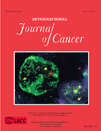SCCA antigen combined with alpha-fetoprotein as serologic markers of HCC
Abstract
Hepatocellular carcinoma (HCC) is the fifth most common cancer in the world. Because of its increased incidence in the last decade and the estimated further increase in the next 2 decades, HCC is arousing great interest. In Europe and North America, it commonly develops on cirrhotic livers, and surveillance programs have therefore been suggested to identify early HCC, at a stage when it remains suitable for surgical therapy and has a better clinical outcome. The only serologic marker used in clinical practice is α-fetoprotein (α-FP), but its sensitivity is poor. In our study, 120 patients with HCC and 90 patients with liver cirrhosis were investigated. We report for the first time to our knowledge that as a marker of HCC, the squamous cell carcinoma (SCCA) antigen has high sensitivity (84.2%) but low specificity (48.9%). However, the combination of α-FP and SCCA yielded a correct serologic diagnosis in 90.83% of the HCC patients. A small percentage of patients remain undetected, likely because of the low specificity of SCCA. In conclusion, the combined use of α-FP and SCCA antigen represents a more powerful tool for the serologic detection of HCC. © 2005 Wiley-Liss, Inc.




